ADDICTION
ALCOHOL DEPENDENCE
QUIT SMOKING
ALLERGY
ANTI FUNGAL
FUNGAL INFECTION
FUNGAL NAIL INFECTIONS
ANTI-REJECTION DRUGS
ANTI WORM
ANTIBIOTIC
BACTERIAL INFECTIONS
ARTHRITIS
GOUT
OSTEOARTHRITIS
RHEUMATOID ARTHRITIS
BLOOD
LOW PLATELET COUNT
THROMBOPHLEBITIS
VARICOSE VEINS
COLON
ANAL FISSURE
PILES
ULCERATIVE COLITIS
DIABETES CARE
DIABETES INSIPIDUS
DIABETES TYPE
DIABETIC FOOT ULCERS
GLUCOSE MONITOR
EYES/EAR CARE
DRY EYES
EYE CARE
EYE EXAMINATION
EYE INFECTION
EYE LASHES
EYE PAIN
GLAUCOMA
OCULAR HYPERTENSION
UVEITIS
FEVER CARE
MALARIA
RHEUMATIC FEVER
TYPHOID FEVER
GASTROINTESTINAL
ACIDITY
CONSTIPATION
CROHN'S DISEASE
DIARRHOEA
GALLBLADDER STONES
INTESTINAL ULCERS
IRRITABLE BOWEL SYNDROME
MOTION SICKNESS
NAUSEA
Hetquenil 400 (Hydroxychloroquine)
| Active Ingredient (Generic Name): | Hydroxychloroquine Sulfate |
|---|---|
| Indication: | Rheumatoid arthritis, Systemic lupus erythematosus (SLE), Type 2 diabetes |
| Manufacturer: | Hetero Drugs Ltd |
| Packaging: | 10 tablets in one strip |
| Strength: | 400 mg |
From: $94.00
Hetquenil 400, or Hydroxychloroquine, is prescribed to manage autoimmune conditions like lupus. It regulates the immune response and eases symptoms such as joint pain and fatigue. Take it daily at the same time for effectiveness. It may require weeks for full benefits. Remember not to double dose if a dose is missed. Maintain a healthy, nutrient-rich diet while using this medication. Watch for serious side effects like vision changes and irregular heartbeat. Seek immediate medical help for emergencies. Inform healthcare providers about your medicines. Familiarize yourself with potential drug interactions. Consider brand names like Plaquenil and Quineprox.
Why is this medication prescribed?
If you have been wondering why Hetquenil 400 (Hydroxychloroquine) is prescribed, it’s primarily used to treat various autoimmune conditions such as lupus and rheumatoid arthritis. These conditions occur when the immune system mistakenly attacks healthy cells, leading to inflammation and tissue damage. Hydroxychloroquine works by regulating the immune system, reducing inflammation, and relieving symptoms such as joint pain, swelling, and fatigue.
In the case of lupus, Hydroxychloroquine can help control the symptoms of this chronic autoimmune disease, including skin rashes, joint pain, and organ inflammation. For rheumatoid arthritis, this medication can slow down the progression of joint damage and improve overall joint function. Additionally, Hydroxychloroquine is sometimes prescribed off-label for conditions like malaria and certain skin disorders.
It is vital to follow your healthcare provider’s instructions carefully when taking Hydroxychloroquine to ensure its effectiveness and minimize potential side effects. Make sure to attend regular check-ups and communicate any concerns or changes in your condition to your healthcare team.
How should this medicine be used?
Moving on to how to properly use Hydroxychloroquine, it’s important to understand the recommended administration guidelines for this medication. Hydroxychloroquine is typically taken orally with food or milk to prevent stomach upset. The dosage prescribed by your healthcare provider is based on factors such as your medical condition and response to treatment. It’s essential to take this medication exactly as directed by your doctor. Don’t increase or decrease the dose without consulting them first.
To guarantee the effectiveness of Hydroxychloroquine, take it at the same time each day. It may take several weeks before you experience the full benefits of this medication, so continue using it as prescribed. If you miss a dose, take it as soon as you remember. However, if it’s almost time for your next dose, skip the missed dose and resume your regular dosing schedule. Don’t double the dose to catch up. If you have any questions regarding the use of Hydroxychloroquine, consult your healthcare provider for clarification.
Other uses for this medicine
Hydroxychloroquine may also be utilized for other medical conditions as determined by your healthcare provider. Apart from its primary use in treating malaria and certain autoimmune diseases like lupus and rheumatoid arthritis, hydroxychloroquine has shown potential in managing conditions such as porphyria cutanea tarda, Q fever, and chronic Q fever endocarditis.
In some cases, it has been prescribed off-label for skin conditions like dermatomyositis, lichen planus, and sarcoidosis. Additionally, hydroxychloroquine is being studied for its antiviral properties, particularly in the context of viral infections such as HIV and Zika virus. The medication’s immunomodulatory effects have sparked interest in exploring its efficacy in treating conditions related to immune dysregulation.
However, it’s important to consult your healthcare provider before using hydroxychloroquine for any condition not specifically approved by regulatory authorities, as individual factors may influence its safety and effectiveness for off-label use.
What special precautions should I follow?
When taking Hetquenil 400 (Hydroxychloroquine), it’s important to check for drug interactions. Make sure to inform your healthcare provider about any other medications you’re taking to prevent potential complications.
Being cautious about drug interactions can help guarantee the safe and effective use of this medication.
Check for Drug Interactions
Be cautious and vigilant about potential interactions with other medications while taking Hetquenil 400 (Hydroxychloroquine).
-
Consult your healthcare provider: Always inform your doctor about all the medications, supplements, and vitamins you’re currently taking to avoid any adverse reactions.
-
Read medication labels: Check the labels of all your medications to identify any ingredients that may interact negatively with hydroxychloroquine.
-
Pharmacist assistance: Ask your pharmacist for guidance when picking up new medications, ensuring they’re safe to take alongside hydroxychloroquine.
-
Monitoring and reporting: Keep track of any unusual symptoms or side effects and report them promptly to your healthcare provider to address any potential drug interactions.
What special dietary instructions should I follow?
Maintaining a well-rounded diet rich in nutrients is vital while taking Hetquenil 400 (Hydroxychloroquine) to optimize its effectiveness. Make sure your meals consist of a variety of fruits, vegetables, whole grains, lean proteins, and healthy fats. Including foods high in antioxidants, such as berries, spinach, and nuts, can be beneficial due to their anti-inflammatory properties. Additionally, try to limit processed foods, sugary snacks, and excessive amounts of caffeine and alcohol, as these may interfere with the medication’s efficacy.
Sustaining proper hydration is essential, so remember to drink an adequate amount of water throughout the day. Some individuals may experience gastrointestinal side effects like nausea or diarrhea when taking Hydroxychloroquine; in such cases, consuming bland, easily digestible foods may help alleviate discomfort. If you have any specific dietary concerns or restrictions, it’s advisable to consult with a healthcare provider or a registered dietitian for personalized guidance on how to best support your health while on this medication.
What should I do if I forget a dose?
If you overlook to take a dose of Hetquenil 400 (Hydroxychloroquine), here’s what you should do. If you miss a dose, take it as soon as you recall. However, if it’s nearly time for your next scheduled dose, skip the missed one and continue with your regular dosing schedule. Don’t take a double dose to compensate for the missed one. It’s vital to maintain consistency in your medication intake to guarantee its effectiveness.
If you often forget doses, consider setting up reminders on your phone, placing the medication in a visible location, or using a pill organizer. If you continue to struggle with remembering doses, speak to your healthcare provider for additional support and advice. It’s important to stay on track with your medication regimen to manage your condition effectively. Remember, consistency is key in achieving the desired therapeutic outcomes of Hetquenil 400.
What side effects can this medication cause?
Hetquenil 400 (Hydroxychloroquine) can cause various side effects that you should be aware of. Monitor for persistent adverse effects, as some can be serious.
If you experience symptoms like vision changes, muscle weakness, or irregular heartbeat, contact your healthcare provider promptly.
Monitor for Persistent Adverse Effects
To monitor for persistent adverse effects caused by Hetquenil 400 (Hydroxychloroquine), be aware of potential side effects that may include nausea, headache, and vision changes.
- Nausea: Feeling sick to your stomach is a common side effect that may occur.
- Headache: You might experience headaches while taking this medication.
- Vision Changes: Be cautious of any alterations in your vision, such as blurriness or difficulty seeing clearly.
- Skin Reactions: Pay attention to any skin rashes, itching, or sensitivity to sunlight that may develop.
Being vigilant about these symptoms can help you and your healthcare provider manage any potential adverse effects of Hetquenil 400.
Some side effects can be serious. If you experience any of the following symptoms, call your doctor immediately:
Being aware of potential serious side effects of Hetquenil 400 (Hydroxychloroquine) is essential for prompt medical attention if experienced. If you experience any of the following symptoms, call your doctor immediately:
-
Vision changes: such as blurred vision, difficulty focusing, or seeing halos around lights.
-
Muscle weakness: especially accompanied by a fever or feeling unwell.
-
Irregular heartbeat: including a rapid or pounding heartbeat.
-
Mental/mood changes: like confusion, hallucinations, or severe anxiety.
What should I know about the storage and disposal of this medication?
When storing or disposing of Hydroxychloroquine, make sure you follow proper guidelines to maintain its effectiveness and prevent harm to others. This medication should be kept in its original container at room temperature, away from moisture and heat. Avoid freezing or exposing it to light. Keep it out of reach of children and pets to prevent accidental ingestion. Don’t store Hydroxychloroquine in the bathroom or near the kitchen sink where it could be exposed to moisture.
If you no longer need the medication or it has expired, don’t keep it around. Properly dispose of any unused Hydroxychloroquine following local guidelines or medication take-back programs. Don’t flush it down the toilet unless instructed to do so. Instead, consult with your pharmacist or healthcare provider on the best way to safely dispose of the medication.
In case of an emergency/overdose
In the event of an overdose or emergency involving Hetquenil 400 (Hydroxychloroquine), immediate medical assistance is essential to guarantee prompt and appropriate care. If you suspect an overdose or experience severe symptoms such as dizziness, fainting, difficulty breathing, or irregular heartbeats after taking Hetquenil 400, contact emergency services right away. Don’t delay seeking help, as timely medical intervention is critical in such situations.
When contacting healthcare professionals or poison control centers regarding a Hetquenil 400 overdose, be prepared to provide important information such as the amount of medication taken, the time of ingestion, and any symptoms experienced. This information will assist healthcare providers in determining the appropriate course of action to manage the overdose effectively.
Never attempt to treat a Hetquenil 400 overdose at home or induce vomiting unless instructed to do so by healthcare professionals. Follow their guidance carefully to ensure the best possible outcome in case of an emergency involving Hetquenil 400.
What other information should I know?
To ensure safe and effective use of Hetquenil 400 (Hydroxychloroquine), it’s important to be aware of potential drug interactions and side effects. Before taking this medication, inform your healthcare provider about all the prescription and over-the-counter medications, vitamins, and herbal supplements you’re currently taking. Certain medications like digoxin, cyclosporine, and diabetes drugs may interact with Hydroxychloroquine, affecting its effectiveness or increasing the risk of side effects.
It’s vital to follow the prescribed dosage and schedule provided by your doctor. Don’t adjust the dosage without consulting them first. Hydroxychloroquine should be taken with food or milk to help prevent stomach upset. Additionally, inform your healthcare provider if you experience any side effects such as vision changes, muscle weakness, or mood changes while taking this medication.
Regular eye exams are essential while using Hydroxychloroquine to monitor for any potential eye problems. If you’re pregnant or planning to become pregnant, discuss the risks and benefits of using this medication with your doctor.
Brand names
You can find Hydroxychloroquine marketed under various brand names. This medication is commonly known by the brand names Plaquenil, Quineprox, and Dolquine. Each of these brands contains Hydroxychloroquine as the active ingredient and is used for treating conditions like malaria, lupus, and rheumatoid arthritis. Below is a table highlighting some of the common brand names for Hydroxychloroquine:
| Brand Name | Active Ingredient |
|---|---|
| Plaquenil | Hydroxychloroquine |
| Quineprox | Hydroxychloroquine |
| Dolquine | Hydroxychloroquine |
| Axemal | Hydroxychloroquine |
| HCQS | Hydroxychloroquine |
It’s important to note that while these brand names may differ, they all contain the same active ingredient, Hydroxychloroquine, and serve the same purpose in treating various medical conditions. Always consult your healthcare provider or pharmacist if you have any questions or concerns regarding the brand of Hydroxychloroquine prescribed to you.
Purchase Locations
When looking to purchase Hydroxychloroquine, consider checking with local pharmacies or online retailers for availability. Local pharmacies are a convenient option as they may have the medication in stock or be able to order it for you. It’s advisable to call ahead to confirm availability and inquire about any prescription requirements.
Online retailers also offer Hydroxychloroquine, but be cautious and make sure you’re purchasing from a reputable source to avoid counterfeit products. Check the credibility of the website, verify the product’s authenticity, and review customer feedback if possible before making a purchase. Some online retailers may require a prescription, so be prepared to provide one if needed.
Additionally, consider factors like shipping times, costs, and return policies when buying from online sources. By exploring both local pharmacies and online retailers, you can increase your chances of finding Hydroxychloroquine to meet your needs.
To summarise
Let’s wrap up the discussion by summarizing the key points.
Hydroxychloroquine, marketed as Hetquenil 400, is primarily used to treat malaria, lupus, and rheumatoid arthritis. It’s believed to work by interfering with the communication between cells in the immune system. The medication has garnered attention due to its potential use in managing COVID-19, but its effectiveness for this purpose remains uncertain and is subject to ongoing research.
When considering Hetquenil 400, it’s vital to consult a healthcare professional before use to determine the appropriate dosage and verify it’s safe for you. Possible side effects include nausea, dizziness, and vision changes, and in rare cases, more severe reactions can occur.
To obtain Hetquenil 400, you typically need a prescription from a licensed healthcare provider. It’s important to source the medication from reputable pharmacies or healthcare facilities to achieve its quality and authenticity. Remember to follow the prescribed dosage and guidelines for best results and to minimize the risk of adverse effects.


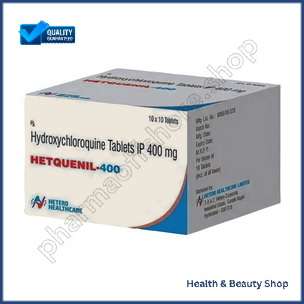
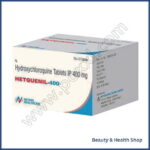
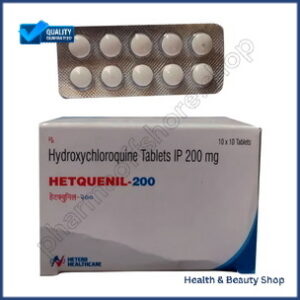
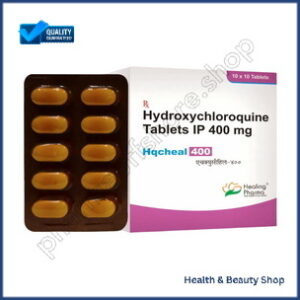
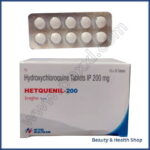
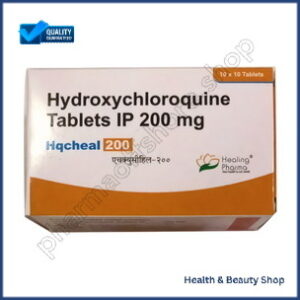
There are no reviews yet.